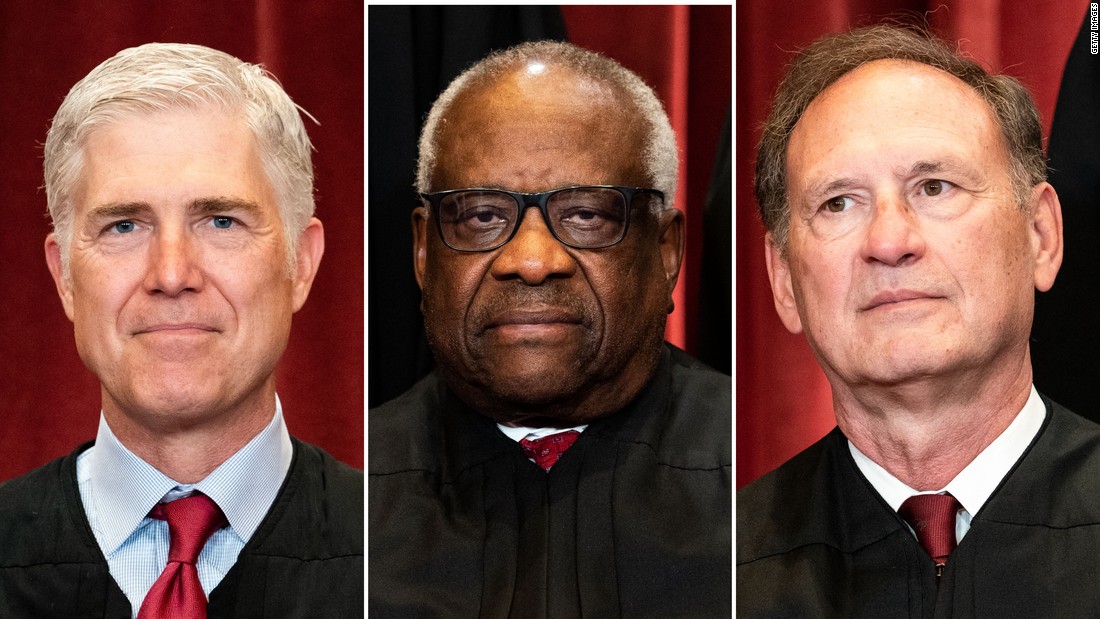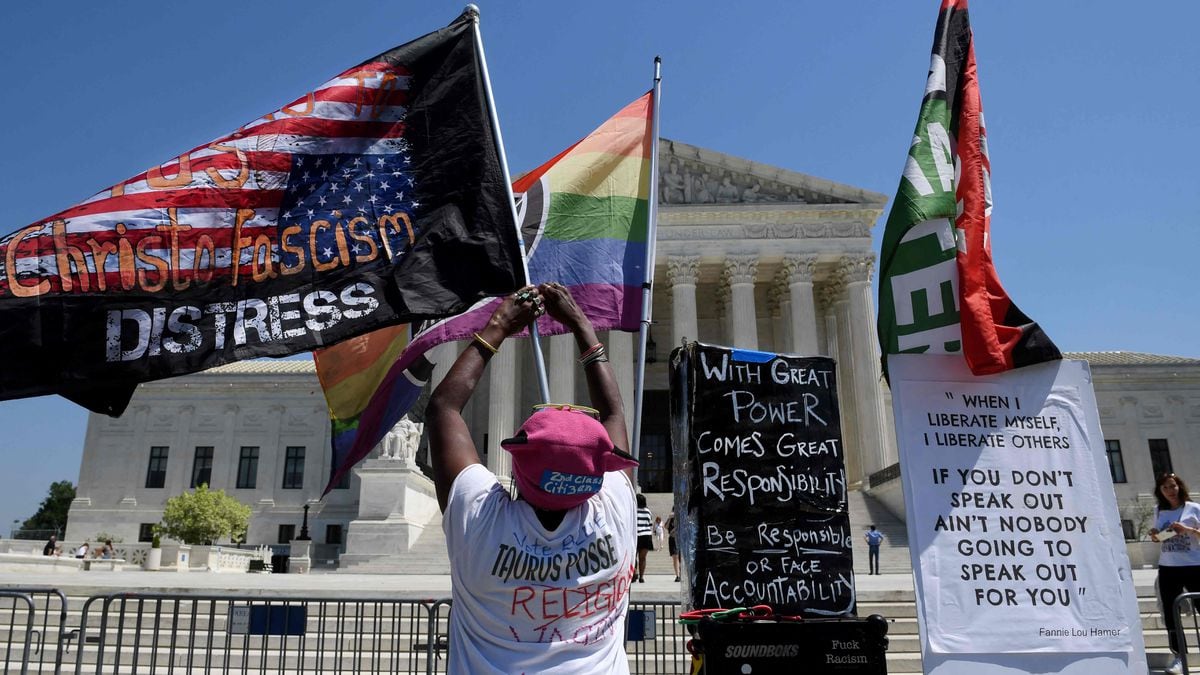Who should be vaccinated in the United States after the Court's ruling?
2:40
(CNN) ––
The United States Supreme Court on Thursday undermined the efforts of the Biden administration to stop the spread of covid-19 among workers.
And, just as important, it revealed how much conservative justices want the federal government to withdraw from the daily lives of Americans.
US Supreme Court Blocks Vaccination Mandate for Big Business
Right-wing judges expressed concern that US agencies are regulating "the daily lives and freedoms of millions of Americans," as Neil Gorsuch put it.
Also that "the Executive Branch already touches almost all aspects of American life," as Samuel Alito wrote.
"These cases have nothing to do with the efficacy or importance of vaccines against covid-19," Judge Clarence Thomas added in one of the controversies.
"It's just a matter of whether (a federal agency) has the legal authority to compel health care workers, by coercing their employers, to undergo a medical procedure they don't want and can't undo," he said.
What is at stake in the Supreme Court?
His views, which have intensified in recent years, are likely to result in limits on federal power over public health and safety, job protections and environmental safeguards.
On the immediate horizon, with the cases due to be discussed in February, there are questions about the scope of the Environmental Protection Agency to reduce emissions from power plants.
USA: Supreme Court decides the future of Roe vs.
wade 0:43
The urgency of the current pandemic, which leaves nearly 1 million Americans dead, has not convinced conservatives to back down.
Instead, the cases offered an opportunity—especially for three far-right judges—to show determination in this area of the law.
advertising
At stake are practical issues related to government efforts to protect public health and the environment.
As well as fundamental concerns about the separation of powers.
Restrictions on Federal Agencies
The conservative majority, led by Chief Justice John Roberts, has increasingly restricted regulatory authority.
As seen in Thursday's decision that blocked the vaccination requirement for large employers, which could have affected nearly 80 million workers.
But Roberts has not pushed as hard as Thomas, Alito and Gorsuch for a total overhaul of federal power. Roberts, in fact, voted separately Thursday to allow the secretary of Health and Human Services to impose a vaccination mandate on workers in hospitals and other places that receive federal funds from Medicare and Medicaid.
ANALYSIS | How a tennis legend, the US Supreme Court and the Winter Olympics reshape the politics of the pandemic
Justice Brett Kavanaugh joined Roberts, along with the three liberal Supreme Court justices, in that decision that impacted some 10 million health care workers. In disagreement were Thomas, Alito and Gorsuch, in addition to the last justice appointed by former President Donald Trump, Amy Coney Barrett.
Power struggle in the Supreme Court
The bickering and shifting votes laid bare the Conservative-Liberal power struggle on this nine-member court.
But, they also showed that within the mainstream right, there are three justices -- Thomas, Alito, Gorsuch -- who wield a stronger focus against the traditional authority of federal agencies.
Their positions could more significantly jeopardize US regulators, as well as their inherent expertise, while simultaneously giving more power to the judiciary.
To the extent that Justices Stephen Breyer, Sonia Sotomayor and Elena Kagan, disagreeing when the majority rejected the Occupational Safety and Health Administration's (OSHA) vaccination order, they wrote: "The agency has thoroughly evaluated the risks that disease poses to workers in all sectors of the economy... The agency's guideline is based on half a century of experience and expertise in handling workplace health and safety issues. it also has the virtue of political accountability, as OSHA is accountable to the President, and the President is accountable to ––and can be held accountable by–– the American public."
The Liberals continued: "And then there is this court. Its members are elected by no one and accountable to no one. And we lack the background, the competence and the experience to assess workplace health and safety issues." ".
"serious danger"
The Biden administration argued that OSHA's power to compel employers with 100 or more workers to institute a requirement for weekly COVID-19 vaccinations or tests and face masks stemmed from its legal authority to protect employees from "grave danger." " due to exposure to new risks and harmful agents.
Dismissing those arguments, the Supreme Court declared in its main opinion that OSHA exceeded its role in workplace safety by addressing broad public health concerns related to COVID-19.
The majority opinion, which was not signed, narrowly interpreted OSHA's power over "occupational" safety.
He described Biden's rule as a "blunt instrument" that "makes no distinctions based on industry or risk of exposure to Covid-19. Therefore, most lifeguards and defense personnel face the same regulations as doctors." and meat packers.
The Supreme Court emphasized that the vaccine rules "were not appropriately tailored to the risks faced by different types of workers and workplaces."
Which reflects a traditionally conservative interpretation.
Power Limits to OSHA
In contrast, the three conservatives who offered a separate concurring statement wrote more extensively about the limits of agency power.
They also addressed broader constitutional questions about the separation of powers.
They touched on themes embraced by the Trump administration, which sought to diminish the scope of the "administrative state" in its political agenda and in the selection of judicial candidates.
"If administrative agencies seek to regulate the daily lives and liberties of millions of Americans, they should at least pursue that power until a clear grant of authority from Congress," Gorsuch wrote, along with Thomas and Alito.
Gorusch noted that Congress may sometimes "be tempted to delegate power to agencies" to avoid being held accountable for unpopular policies.
But he added: "If Congress could turn over all of its legislative powers to unelected agency officials, it would shatter the entire scheme of our Constitution. And it would allow the intrusion into the privacy and liberty of Americans by simple edict, in instead of only with the consent of their elected representatives."
A long debate in the Supreme Court
Versions of the debate over Congress's ability to delegate power to agencies have played out in previous cases.
Liberals often emphasize that Congress relies on agencies to implement laws in today's increasingly complex times.
On Thursday, however, the three Liberals chose to focus on the immediate cost to the country of the OSHA ruling.
"Faced with a pandemic that continues to spread, this court is telling the agency tasked with keeping workers safe that it may not do so in all necessary workplaces. As illness and death continue to rise, this court tells the agency that it cannot respond in the most effective way possible... It undermines the ability of responsible federal officials, acting within the scope of their authority, to protect American workers from grave danger," Breyer wrote, Sotomayor and Kagan in a joint statement.
Supreme Court


/cloudfront-eu-central-1.images.arcpublishing.com/prisa/RFXKLPJ6S5PGXJYGTELOFX5R6E.jpg)
/cloudfront-eu-central-1.images.arcpublishing.com/prisa/HOYACHRDBRFGLP4PL7WJESEESQ.jpg)











